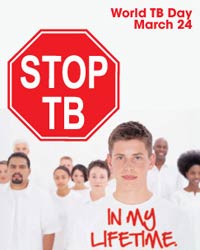World TB Day 2012: Stop TB in My Lifetime
 Each year, CDC and others recognize World TB Day on March 24. Tuberculosis (TB) is one of the world's deadliest diseases. Learn more about TB risk factors that can increase the chance of developing TB disease.
Each year, CDC and others recognize World TB Day on March 24. Tuberculosis (TB) is one of the world's deadliest diseases. Learn more about TB risk factors that can increase the chance of developing TB disease.
Tuberculosis, also called TB, is one of the world's deadliest diseases and has been affecting people for thousands of years. It's estimated that 2 billion people — one third of the people in the world — are infected with M. tuberculosis. Each year, nearly 9 million people in the world become sick with TB disease, and almost 1.5 million deaths are attributed to TB. While the number of TB cases in the United States has been declining since 1993, there remains a higher-than-normal burden of TB among racial and ethnic minorities. This is due to unequal distribution of TB risk factors that can increase the chance of developing the disease.
World TB Day
 World TB Day is observed annually on March 24 to educate the public that TB remains a problem in much of the world, with much more needed to prevent, control, and eventually eliminate this devastating disease. This day provides an opportunity to raise awareness about TB-related problems and solutions, and to support worldwide TB-control efforts. This year, CDC is joining the global Stop TB Partnership in adopting the theme, "Stop TB in my lifetime." People are encouraged to imagine a world free of TB and to state what changes they expect in their lifetimes such as a better TB test, faster treatment, or no more TB deaths.
World TB Day is observed annually on March 24 to educate the public that TB remains a problem in much of the world, with much more needed to prevent, control, and eventually eliminate this devastating disease. This day provides an opportunity to raise awareness about TB-related problems and solutions, and to support worldwide TB-control efforts. This year, CDC is joining the global Stop TB Partnership in adopting the theme, "Stop TB in my lifetime." People are encouraged to imagine a world free of TB and to state what changes they expect in their lifetimes such as a better TB test, faster treatment, or no more TB deaths.
What CDC is Doing
Researchers in CDC's Division of Tuberculosis Elimination and their partners in the TB Trials Consortium are at the forefront of the research that is striving to make the world free of TB. They recently completed a 10-year study of an innovative preventive therapy regimen that will dramatically shorten treatment for persons with latent (inactive) TB infections. This course of preventive therapy is referred to as the 12-dose regimen and contains two very effective TB drugs, isoniazid and rifapentine. It is given once weekly for 12 weeks under directly observed therapy, which means that the swallowing of each dose of medicine is observed by a health worker.
The concept of TB preventive therapy involves treating people who are infected with TB but who are not clinically ill. Doing so can prevent those infected persons from progressing to TB disease. Preventive therapy not only prevents disease and disability in that one person; it also prevents the spread of infection to others, some of whom would develop TB in the future and then spread the bacteria to their close contacts. We can only reach the goal of a world free of TB by working together to detect, treat, and prevent this disease.
Working Together to Stop TB in our Lifetime
 "This is not the time to be complacent about TB diagnosis and treatment. We need to maintain a clear vision of delivering same day diagnosis and treatment, if at all possible, and strive to eliminate TB in our lifetime" (Dr. Kenneth Castro, Director, Division of Tuberculosis Elimination, Centers for Disease Control and Prevention)
"This is not the time to be complacent about TB diagnosis and treatment. We need to maintain a clear vision of delivering same day diagnosis and treatment, if at all possible, and strive to eliminate TB in our lifetime" (Dr. Kenneth Castro, Director, Division of Tuberculosis Elimination, Centers for Disease Control and Prevention)
What Can You Do?
- Learn more about TB. Local and state coalitions are convening educational and awareness activities related to World TB Day to raise awareness of this deadly disease. Check out the activities and get involved.
- Promote World TB Day. Send a World TB Day e-card or add a World TB Day button to your Web site to increase awareness of this important day.
Until TB is eliminated, World TB Day won't be a celebration. But it is a valuable opportunity to educate the public about the devastation of TB and how it can be stopped.
More Information
World TB Day Resources
- CDC World TB Day
- CDC World TB Day Resources
- History of World TB Day
- TB Elimination: Now is the Time!
- Stop TB in My Lifetime: A Call for a World Free of TB - World TB Day 2012 Podcast
- Forging Partnerships to Eliminate Tuberculosis
- Global Stop TB Partnership – World TB Day
Additional Information About TB
- CDC Questions and Answers about TB
- Tuberculosis: General Information
- Basic Tuberculosis Facts Podcast
- List of State TB Control Offices
- Surveillance Data
CDC works 24/7 saving lives and protecting people from health threats to have a more secure nation. A US federal agency, CDC helps make the healthy choice the easy choice by putting science and prevention into action. CDC works to help people live longer, healthier and more productive lives.
Get email updates
To receive email updates about this page, enter your email address:
Contact Us:
- Centers for Disease Control and Prevention
1600 Clifton Rd
Atlanta, GA 30333 - 800-CDC-INFO
(800-232-4636)
TTY: (888) 232-6348 - Contact CDC-INFO



